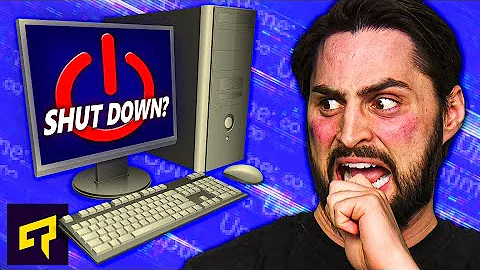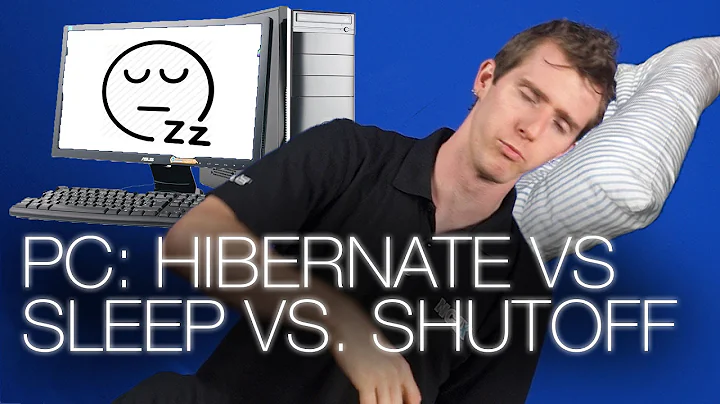Is it still necessary to shut down computers?
Solution 1
From a software perspective, an operating system and the programs you run on it tend to accumulate all sorts of cruft over extended periods of use - temporary files, disk caches, page files, open file descriptors, pipes, sockets, zombie processes, memory leaks, etc. etc. etc. All that stuff can slow down the computer, but it all goes away when you shut down or restart the system. So shutting down your computer every once in a while - and I do mean actually shutting down, not just hibernating or putting it to sleep - can give it a "fresh start" of sorts and make it seem nice and zippy again.
However, different computers and OS's are not all equally affected by this phenomenon. Generally, a computer with a lot of RAM can go for much longer than a computer with only a little RAM. A server, on which you just start up a few programs and then let them work, will be fine for much longer than a desktop computer, where you're constantly opening and closing different programs and doing different things with them. Plus, server operating systems are optimized for long-term use. It's also been said that Linux and Mac OS tend to run for longer than Windows systems, although in my experience that mostly depends on what programs you use on them, and not so much on any differences between the kernels of the operating systems themselves.
From a hardware perspective, hard drives, because they have moving parts, will age when they are kept powered on. Silicon chips age with heat and power on cycles. Even though the operating system will run without a problem, the hardware will age when left on and when initially powered on.
Solution 2
The most obvious effect of leaving a computer running rather than shutting down can be seen in the electric bill. A computer will still draw power while in sleep mode (significantly less than when running), but if it's in hibernate mode it won't draw any more power than when it's off.
Solution 3
Other than the energy uses mentioned, further disadvantages of running your computer continously (i.e. not on standby) when not using are:
- Fans get clogged up with more dust which can eventually cause overheating
- More risk of power cuts/surges that can potentially do damage (mainly to desktops). This might still be a problem if it is on standby though.
- Computer may be more vulnerable to remote attacks if you happen to have unpatched/susceptible software and an inadequate firewall. Of course you want to make sure that your computer does not have this problem regardless of how much you use it.
Advantages:
- Less heat up/cool down cycles that eventually damage certain components
Solution 4
All components like HDD, DVD-ROM's have a rated MTTF defined i.e number of spinning hours before failure, make sure you check the ratings for accurate figures. Most laptop HDD's used have thousands of spin down cycles before they die down.
As with all mechanical devices, more number of power down cycles causes more wear and tear than keeping it actually running all the time.
Solution 5
This question comes up a lot. My take on it is "it doesn't matter". Shut it down if you feel compelled. Leave it on if you want to. Personally I use suspend a lot.
Related videos on Youtube
JFW
OS Usage Statistics: Ex-Windows User: 7 years. Mac User: 4 years. Linux User (Ubuntu + Other distros): 1.5 years.
Updated on September 17, 2022Comments
-
JFW almost 2 years
Nowadays with our modern operating systems, is it necessary to fully shutdown computers instead of choosing to stand-by or hibernate computers (desktops and laptops)?
Would there be any side-effects of keeping a computer running continuously without a shutdown (putting it to sleep or hibernating it when it is not used)? For example, hard drive life decrease, system internals (Processors, RAM etc.) aging faster than usual, etc?
-
JFW almost 14 yearsIs suspend the same as hibernate?
-
JFW almost 14 yearsIf the power supply failed earlier, are there any indications that it has failed, and would the failure affect the other parts of the computer?
-
Murray Furtado almost 14 yearsYes, suspend is a synonym for hibernate.
-
Nathan Fellman almost 14 yearsDepends on the system. On XP, for instance, suspend saves all the state to RAM, and leaves the computer powered on at a very low power. When you leave suspend mode, the cpu state is copied from the RAM. Hibernate, on the other hand, saves the contents of the memory to disk and actually powers down the system so that you can even unplug it. When you turn it back on, instead of booting the OS, it restores it from the disk.
-
DMA57361 almost 14 years+1 I switch my desktop off when not in use (for longer periods, such as overnight or if I'm going to work/shop/etc) and then switch of the surge protector it, and all the peripherals, are connected to. It doesn't even drain the (admittedly tiny) power it would when off this way (neither do the screen, speakers, printer, etc).
-
Mike L. almost 14 yearsYour last paragraph: do you also keep your car running?
-
Mike L. almost 14 yearsMe, too. For people, who don't switch off unused computers or TVs, energy obviously is (still) too cheap.
-
 James P almost 14 years@panzerschreck: Under many situations power management causes hard disks to park heads or spin down completely when the PC is on but idle. This itself causes wear eventually.
James P almost 14 years@panzerschreck: Under many situations power management causes hard disks to park heads or spin down completely when the PC is on but idle. This itself causes wear eventually. -
Mircea Chirea almost 14 yearsWell a computer in stanby (sleep) will only use 10% of it's power-on fully idle consumption. Hibernate is the same as shutdown, where only a few components receive minuscule amounts of power (usually motherboard, maybe NIC). The difference between sleep and powered-on is massive yet the wake time is only a few seconds, so always put the computer into sleep when not using it.
-
Sirex almost 14 yearsthis is why you set power management to not do that.
-
DMA57361 almost 14 years@iconiK It might be minuscule drain, but if I disconnect 10-15 objects accross my home it's quite a bit over a year, and it's not just mobo & NIC when "off", there's your screen and anything with an external power-pack draining as well. Also, do you really need your computer to switch on and be ready within 5s? I tend to switch mine on, go and make a cuppa, and then it's ready to use when I get back to my desk.
-
DMA57361 almost 14 yearsand then instead of power cycle's causing problems you have constant mechanical wear causing problems. So, the real question is - which is more likely to cause breakdown? Do we have any stats or research on this?
-
Mircea Chirea almost 14 yearsWell booting from a HDD can take several minutes, which at work is a pretty large productivity waste (especially for programmers or designers, who need several minutes to concentrate). Of course, if you have a fast HDD or SSD this is all moot.
-
DMA57361 almost 14 years@iconiK But you only need to boot the machine once per work day. And, the first 2minutes from an 8hour work day is hardly much of a waste (incidentally "several minutes" to boot up is appauling slow). Over the course of a working day I'm away from my desk much longer than 2mins from just a few loo breaks and to get a few cups of tea. And lets not compare it to the time people can waste on SO or SU! ;)
-
JFW almost 14 yearsYes, of course-Different OS has different terminology for basically the same actions. For Mac, stand-by is sleep, while hibernate is deep-sleep.
-
JFW almost 14 yearsYes, I understand that the PSU supplies the power to the desktop. I have heard of stories before, like you have said, the PSU burning through and taking away the processor, graphics card, as well as numerous sticks of RAM along with it. Are there any visual or obvious indications onscreen when the PSU fails? (Computer not starting might also be some other problems-HD crash/failure, monitor dead, ...)
-
JFW almost 14 yearsWould using a PSU in the build stop the power cut/surge problems? What would happen to the desktop if the electricity cuts/surges? Damages to the filesystem/HD or also other interior parts too?
-
chronos almost 14 yearsI heard bare-bones Windows'95 was rock-stable for months of uptime... especially with no other programs running.
-
hotei almost 14 yearsI have had numerous (> 10) power supplies fail over the years and I've never lost anything but the PSU in the process. The quality of the PSU is important. I replace OEM PSUs with Antec now and have had 0 failures in last 10 years or so. Your mileage may vary.
-
hotei almost 14 years@Chronos: That comment may be too subtle for people that never experienced Win95 first-hand. :-)
-
hotei almost 14 years@torbengb: On Ubuntu (Linux) they're different. Suspend -> RAM. Hibernate -> Disk. Suspend recovers almost instantly which I why I prefer it most of the time. +1 to Nathans explanation why.
-
JFW almost 14 years@hotei I still remember using Windows 95 from a long time ago and it seemed fine in my opinion. ... Did I not use it long enough? :O?
-
JFW almost 14 yearsWhat about Corsair? I'm about to get a PSU from them soon in a custom desktop build.
-
JFW almost 14 years@James Isn't parking the head of the HD a good thing? So it won't waste any more motion and would be locked in place?
-
DMA57361 almost 14 years@hotei Ouch, over 10 failures? I hope you work with lots of machines! @JFW I've had a PSU blow on my home desktop a long time ago, which took out several components - my own fault, it was fairly cheap and I think I overloaded it - and I've since been told (not verified!) that a buzzing sound from a PSU (especially if the PC is off) is a sign that the PSU if on it's way out - can anyone confirm he accuracy of this?
-
DMA57361 almost 14 yearsRE you're first sentence: You have to use a PSU (Power Supply Unit) in a desktop, it's not optional - it's what steps down the mains voltage for your components, are you maybe thinking of UPS (Uninteruptable Power Supply)? In a power surge most(all?) PSU's will not help much - if they cannot absorb the extra voltage they may blow, pass the surge on to your components or possibly both. And power cuts are less of a concern now compared to the past (and a PSU won't help here) - but you can still loose data and/or corrupt files (but it's much less common than in "the old days").
-
JFW almost 14 yearsMy apologies-Wrong term. UPS, I meant. Would an UPS stem the problem of the risk of power cuts/surges?
-
 James P almost 14 yearsIt only becomes a problem when it happens excessively. On some configurations some drives have a habit of parking the head after just a few seconds of inactivity. When the hard disk needs to empty its write buffer it then unparks the head again. This is called a load/unload cycle. If there's program running in the background that is continually writing to a file every 5 seconds or so (e.g. when a program writes to a log file) then it may lead to hundreds of load/unload cycles a day. Eventually after some years it is possible to reach the nominal load/unload figure quoted by the manufacturer.
James P almost 14 yearsIt only becomes a problem when it happens excessively. On some configurations some drives have a habit of parking the head after just a few seconds of inactivity. When the hard disk needs to empty its write buffer it then unparks the head again. This is called a load/unload cycle. If there's program running in the background that is continually writing to a file every 5 seconds or so (e.g. when a program writes to a log file) then it may lead to hundreds of load/unload cycles a day. Eventually after some years it is possible to reach the nominal load/unload figure quoted by the manufacturer. -
 James P almost 14 yearsIt should be noted that the disk parks the read/write head partly to protect against shocks so it is normally a good thing and more common on laptop drives.
James P almost 14 yearsIt should be noted that the disk parks the read/write head partly to protect against shocks so it is normally a good thing and more common on laptop drives. -
DMA57361 almost 14 yearsA UPS is designed to handle power cuts - it provides a backup battery for a short period (sometimes only minutes) to allow the desktop to be shutdown correctly. Some UPSs will automatically send a signal to an attached PC and give a shutdown order when the battery is low (much like a laptop does). Most UPSs should also help with surges, sags and spikes - but check what a device covers before purchase.
-
JFW almost 14 yearsAhh... I understand. Would it be better to set the time for the head parking to be 20 or 30 minutes after inactivity then, to prevent the frequent parking?
-
JFW almost 14 years@DMA57361 What would be a good PSU brand to use and what is a good PSU that's not fairly cheap?
-
hotei almost 14 years@DMA57361: That's 10 fails over 30 years and maybe 50 or 60 different machines. I also started using UPS on everything and that probably helped as well. It was cheaper to overbuild with PSU and UPS than to chance the loss of our business data. PS: A continual (non-fan) buzzing is the sound of impending doom. Failure is right around the corner - usually accompanied by an acrid odor from PSU.
-
DMA57361 almost 14 years@JFW - I haven't bought many (clearly no where near as many as hotei!) to be confident in giving a recommendation, but both Antec and Corsair are both reputable. And, @hotei, thanks for confirming that electrical buzz from a PSU is a serious warning.
-
Martin Beckett almost 14 yearsWindows95 famously couldn't run for more than 49days because of a wrap around in a timer - but nobody ever discovered this!
-
John T almost 14 years95 && 98. Download the patch and keep on kicking: support.microsoft.com/kb/216641 :)
-
JFW almost 14 years@hotei Understood. Is the buzzing faint like the hard drive's demise clicking signal or somewhat louder? @DMA57361 Thanks for the recommendations. :) Will look at both soon.
-
JFW almost 14 yearsBut again with today's advancements in technology isn't it no longer necessary to shut down as the electricity used by the computer negligible compared to the overall power usage of the house and all the electronic utilities? (Fridge, dish washer, ...) Especially if parts like WD's Caviar Green drives use less electricity compared to other drives.
-
JFW almost 14 years@mgb Ahh... I understand. I only used computers for 30 minutes max every day then.
-
JFW almost 14 yearsAhh... That's quite interesting-I'd like to also know if you keep your MacBook's battery always plugged in; There are people who say that plugging your laptop in as much as possible would be good for the battery, while other people say that unplugging and replugging when the battery is at ~5% would be more beneficial for the battery as the electrons/ions inside would move around more then being constantly charged and unmoving, causing the laptop to lose charge.
-
JFW almost 14 yearsPower flashes? ...
-
JFW almost 14 yearsWhile doing this, do you experience any slowdowns when doing this everyday without shutting down? (Just interested if there is any slow downs with this implementation.)
-
Mircea Chirea almost 14 years@DMA57361, you'd be surprised how often a machine can get really slow boot times; many companies don't upgrade stuff if it ain't broken, even if dead slow.
-
Martin Beckett almost 14 years@JFW - I think it was more a case of no win95 machine stayed up for 49 days because of other problems, or the fact that MS required you to reboot everytime you changed anything.
-
JFW almost 14 years@mgb -Really? :O I have never heard of such a thing before. Thanks for the info. :)
-
Brian Knoblauch almost 14 yearsNo slowdowns. I'm a fairly heavy user, using lots of resource intensive apps, and don't have any issues like that. XP and Vista SP1 just don't have that issue. Other than non-SP Vista, I haven't seen slowdowns due to time "up" since Windows ME. It just doesn't happen anymore.
-
JFW almost 14 yearsThat sounds great then. :) Thanks for your reply!
-
CarlF almost 14 yearsWell, "bare-bones" Windows 95 was DOS. DOS was in fact rock-stable for months of uptime.
-
 CAD bloke almost 14 years@mklhmnn re: "do you also keep your car running?". No but it would help if I did. Taxi engines last a lot more km/miles simply because the engines don't suffer cold-starts nearly as many times as your average car. "up to 80% of entire engine wear occurs during cold start ups" beslub.com/engwear.htm & an SAE study paper: papers.sae.org/600190
CAD bloke almost 14 years@mklhmnn re: "do you also keep your car running?". No but it would help if I did. Taxi engines last a lot more km/miles simply because the engines don't suffer cold-starts nearly as many times as your average car. "up to 80% of entire engine wear occurs during cold start ups" beslub.com/engwear.htm & an SAE study paper: papers.sae.org/600190 -
intuited over 13 years-1: This is not related to the question. The question clearly asks about the difference between shutting down and going to standby/hibernate.
-
 terdon over 11 yearsActually, it may well be more wasteful to turn the computer off (assuming you will turn it on again soon). The computer reaches the highest rate of energy consumption during boot up, so, it may well be the case that switching it off and on actually consumer more energy than leaving it on standby.
terdon over 11 yearsActually, it may well be more wasteful to turn the computer off (assuming you will turn it on again soon). The computer reaches the highest rate of energy consumption during boot up, so, it may well be the case that switching it off and on actually consumer more energy than leaving it on standby. -
Simon over 11 years@JFW - If you use your Macbook and you are working with it close to a power socket you should absolutely have it plugged it. Why make the battery go through more charging cycles when it doesnt have to or work on reduced power. This is part of answer i posted from apple.stackexchange.com/questions/73564/…
-
Rob over 11 yearsWith linux, you should reboot every time you upgrade your kernel. I upgrade and reboot weekly with archlinux.
-
Sirex over 11 years@terdon: Number 3: energystar.gov/index.cfm?c=power_mgt.pr_power_mgt_faq
-
JamesBarnett over 11 yearsRule #1 of security, if an attacker has physical access to your machine ... it's not your machine any more.
-
 Cees Timmerman almost 11 yearsI bet they used a journaling filesystem like NTFS. FAT32 gets corrupted when it loses power during a write.
Cees Timmerman almost 11 yearsI bet they used a journaling filesystem like NTFS. FAT32 gets corrupted when it loses power during a write. -
prusswan almost 10 yearsAfter several encounters with failing PSUs I went with this approach for my home PC. seems like treating it like a server allows it to live longer like those work computers
-
Petr over 7 yearsThe last part regarding hard drives is irrelevant - when you sleep or hibernate, the hard drive is powered off just like if you just power off




